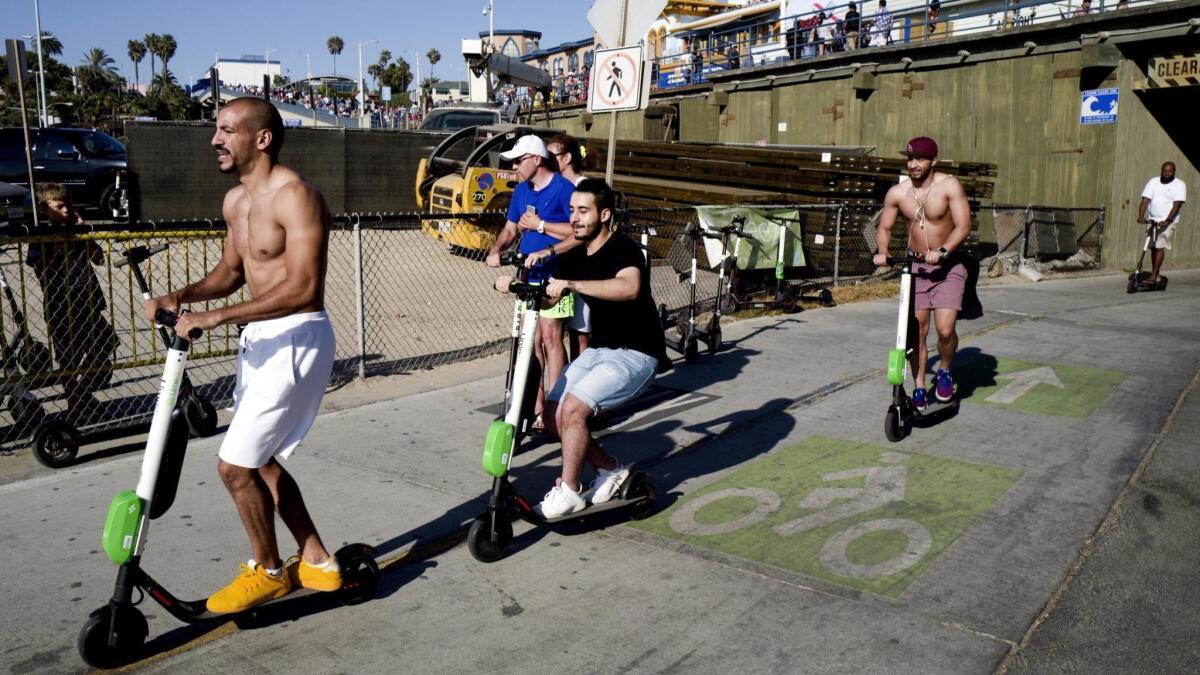Newport council takes dim view of scooters but shies away from ban or new regulations

- Share via
The Newport Beach City Council is skeptical of Bird and other popular rental services that provide dockless electric scooters and bicycles, but not enough to put them under a moratorium.
The council decided Tuesday night to take no action on banning or accommodating the devices, unless city staff proposes a permit. That would indicate a company is willing to work within Newport’s existing rules for business operations and try to keep the devices out of areas where motorized vehicles aren’t allowed, like boardwalks. Any permit would have to be approved by the Planning Commission.
Councilwoman Diane Dixon, whose district includes the congested ocean-facing Balboa Peninsula boardwalk, said she has an open mind but wanted a temporary ban.
She suggested Newport follow developments in Santa Monica, which will launch a pilot program in September requiring e-scooter companies to pay higher fees and share real-time data, among other conditions. However, Santa Monica did not recommend that Bird or the similar Lime be part of the program, leading the companies to turn off their devices there Tuesday in protest.
“I personally don’t believe that we have to say yes to everything,” Dixon said. “We don’t have the room. The boardwalk is at full capacity with even things that are regulated but not enforced,” such as skateboards.
The council voted 5-1 on Tuesday to take the wait-and-see approach, with Dixon voting no and Councilman Kevin Muldoon recusing himself because of his work in the wireless telecommunications industry.
Bird, one of the more popular motorized scooter-sharing start-ups, deployed a fleet of its scooters around the Balboa Peninsula on July 28. But the city said it did so without notice or permits and ordered the company to remove all its scooters by July 31.
Public Works Director Dave Webb said Bird users can legally ride on the street, in bike lanes and on designated bike paths where motorized vehicles are not banned. A dockless device company also could set up a base in another city to avoid needing a specific Newport permit.
Brad Sommers, a Newport traffic engineer, said the city got an “immediate and somewhat negative” response from the community during Bird’s brief run, and city staff promptly let the company know it was violating local codes.
Residents complained about the scooters being left on sidewalks — one of Bird’s key features is that riders can pick up and leave the pay-per-minute scooters anywhere. Riders find and unlock available scooters by using a mobile app.
Some of the scooters drifted into Costa Mesa, Irvine and other Newport neighborhoods besides the Balboa Peninsula, Sommers said.
Councilman Jeff Herdman said he was surprised but not upset that the scooters didn’t also roll out on Balboa Island.
“There’s a part of me that really resents their whole marketing strategy by dumping and getting a lot of free publicity and free advertising out of the act of having dumped their product on our streets, creating a great deal of havoc … and then forcing the issue,” Herdman said. “It’s not a good way to get started in terms of doing business in our city.”
Mayor Pro Tem Will O’Neill said he was hesitant to issue a blanket ban because, in theory, Bird and similar companies could find a way to operate within Newport’s existing rules.
“If there is a possibility that a company can adequately comply with our laws, I don’t think it’s appropriate for us to tell them they cannot even try to get a permit,” he said. “If, on the other hand, we decided that we wanted to just straight up ban them and never allow any of this to ever come into our city, we’d have to modify our laws, I think, as part of a moratorium.”
He added that if the city wanted to change its laws, that would mean trying to get ahead of an unknown technological curve, and he said he wasn’t keen on that either.
Newport resident Don DiCostanzo, who co-founded the Fountain Valley-based Pedego electric bicycle company, said Bird and similar companies shouldn’t get special treatment that he didn’t when he got into the electric bike business 13 years ago. Pedego runs under a more traditional distribution model in which customers pick up and return bikes at a brick-and-mortar shop.
“I tried to follow all the rules, and I just want to make sure that other businesses that come here have to follow the same rules that we did,” DiCostanzo said.
He said the owner of a Pedego store in Venice recently asked him what he should do about three scooters he found on the sidewalk outside his shop, where he said he isn’t allowed to display his own inventory.
DiCostanzo said he should consider them litter and put them in the trash.
“They came by a little later with their app and picked them up from the Dumpster,” he said.
Newport resident Judy Cole, who lives in the Lido Village area, said there are too many motorized vehicles around town.
“I just don’t understand how we can even consider adding more to the mix when we can’t handle the issues that we have today,” Cole said. “It’s a quality-of-life issue for our residents. It’s not the right to be able to do something or to have something. I’m tired of not being able to enjoy our boardwalk and our city streets.”
Webb said Lime and Razor, another Bird competitor, have contacted Newport Beach to make arrangements before potentially entering the local market.
Dixon said she appreciated that. “That’s how it should be done in any professional, respectable way,” she said.
Twitter: @Daily_PilotHD
All the latest on Orange County from Orange County.
Get our free TimesOC newsletter.
You may occasionally receive promotional content from the Daily Pilot.








